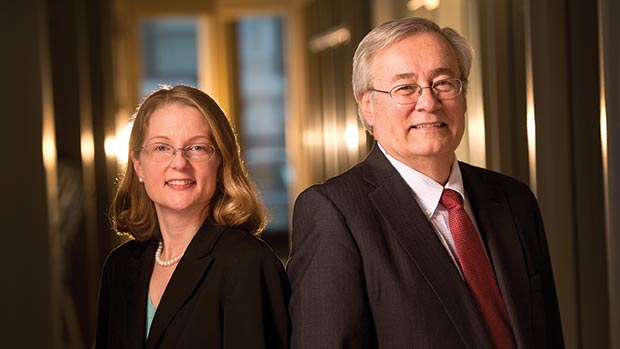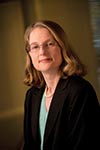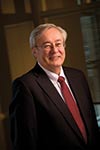Solo practitioner, public-interest lawyer talk difficulties ahead for bar, profession
By: Erika Strebel, [email protected]//February 16, 2018//
Solo practitioner, public-interest lawyer talk difficulties ahead for bar, profession
By: Erika Strebel, [email protected]//February 16, 2018//

This year’s race to take the top leadership spot for Wisconsin lawyers pits a public-interest lawyer against a solo practitioner, both of whom work out of Milwaukee.
The Wisconsin State Bar announced in December that Jill Kastner and Randall Nash had accepted nominations to run for the office.
Nash is a civil litigator who earned his law degree from the University of Wisconsin Law School in 1979.
He was previously a shareholder at the Milwaukee-based firm O’Neil, Cannon, Hollman, DeJong & Laing.
Kastner, who earned her law degree from the University of California’s Los Angeles School of Law in 2000, worked for large law firms in Milwaukee and California for eight years before accepting a position at Legal Action of Wisconsin.
Both have extensive experience with the bar. Kastner’s dates back to 2006, when she returned to Wisconsin after a number of years practicing in California. She has been on the State Bar Board of Governors since 2011, and is also on its Executive Committee, Strategic Planning Committee and Leadership Development Committee. She also was chairwoman of the Board of Governors from 2015 to 2016 and president and a board member of the Bar’s Young Lawyers Division.
Nash’s involvement with the bar started with committee work on its Media-Law Relations Committee, Professionalism Committee and WisLAP Committee. Nash has also been on the Board of Governors since 2014.
Whoever wins the election will serve a one-year term as president-elect, then one year as president, succeeding Chris Rogers of Habush Habush & Rottier. Rogers will become bar president on July 1.
The nominations for the position were made by the State Bar Nomination Committee, whose members were appointed by Paul Swanson, the current bar president.
In other State Bar races, two candidates are running for secretary: Makda Fessahaye, of the Wisconsin Department of Corrections in Madison; and Starlyn Tourtillot of the Menominee Indian Tribe of Wisconsin’s Legal Services Department, Keshena. The position has a two-year term.
Also, two candidates are vying to be the bar’s representative on the Judicial Council: Margo Kirchner of Wisconsin Justice Initiative; and John Orton of Curran, Hollenbeck & Orton. Whoever is elected will serve a three-year term on the council, which is a 21-member independent body that advises the Legislature and Wisconsin Supreme Court on the state’s rules of procedure.
Ballots for the election will be sent out by April 13 and are due April 27. The winners will take office on July 1.
Kastner and Nash took some time last month to sit down with the Wisconsin Law Journal and talk more about what they would bring to the table. Some of their responses have been edited for length.
Kastner: ‘I’m not afraid to make the hard decisions’
 Wisconsin Law Journal: What do you see as the bar president’s role?
Wisconsin Law Journal: What do you see as the bar president’s role?
JK: As the president, you are the spokesperson. The Board of Governors ithe policy-making body. The president is really the one who pushes implementation of it – they’re kind of the face of the bar. One of the things we need to do is have a good relationship with our judicial system.
I think having more judges sit on our committees and be active in other aspects of the bar is really important. I think increasing diversity and inclusion in our committees – and by diversity and inclusion, I’m not just talking about race and gender, I’m talking about people from different backgrounds, people from across the state – so it’s not just a bunch of either big firm lawyers from Milwaukee or government lawyers from Madison – that we have the full scope and range of people.
WLJ: What’s the biggest challenge facing the profession and why?
JK: It’s the changing nature of the profession. The market for legal services is changing. The way you deliver legal services is changing and we need to make sure our members are ready for that change, particularly for our youngest members.
We have more and more of the baby boomers who are retiring. And it won’t be long before millennials are the largest category of attorneys in our workforce. And so, we need to make sure they have the skills, not that they needed 20 years ago, but skills that they need today.
WLJ: What’s the biggest difficulty the bar faces and how do you hope to deal with it it during your terms as president and president-elect?
JK: In terms of the association itself, the biggest thing is decreased dues dollars because we have decreased members. Some people want us to do more with less – I don’t think that’s going to work. That’s not a good long-term strategy. Instead, we need to focus on the things that we need to do, do those things very well, and that may mean not doing certain others things we may have done in the past.
WLJ: If there was one thing you could change about the legal profession, what would it be and why?
JK: To be honest, I can’t think of anything. I spent my first few years practicing in California, and there I would have had an answer: that lawyers be more cordial, that lawyers be more respectful. But here in Wisconsin, we have a lot of that. There are always bad apples, the bad instances. But for the most part, Wisconsin lawyers understand that we’re a smaller community, and we’re respectful to one another. So I’ve always enjoyed that about the Wisconsin practice.
I’m not saying the California lawyers aren’t great. But particularly when you had one big firm against another … no one was cordial to each other. Let’s put it that way. Where here in Wisconsin, I think, we do a much better job of respecting each other, respecting the bench.
WLJ: Why should members vote for you?
JK: I think it’s time for a little bit of a change. Now, I’ve worked a lot of years in the Board of Governors and with Young Lawyers Division and, when I was in the Young Lawyers Division, we instituted a lot of changes. We added new programs that were important programs like the young lawyers leadership conference that’s still going on today.
And if elected president, I plan to continue those changes. I’m not afraid to make the hard decisions. If we need to cut programs, we’re going to cut programs. We need to do a better job of being more fiscally responsible, of doing a cross-benefit analysis of our programs. And if a program requires dues dollars, and it doesn’t fulfill our priorities, it’s got to go.
Nash touts transition from small firm to solo practice
 Wisconsin Law Journal: What do you see as the bar president’s role?
Wisconsin Law Journal: What do you see as the bar president’s role?
RN: I’d like to communicate more about the services provided by the State Bar. That would be point one.
Point two would be disparate incarceration. I would like to be able to continue to follow that issue. I’m not going to say that because the State Bar is looking at it, that we’re going to have a silver bullet and be able to cause big change. But I think there’s a chance that we can get the ball going in a way that might ultimately result in some perception that change would be worthwhile to accomplish.
WLJ: What’s the biggest challenge facing the profession and why?
RN: I do think it’s a very unique time for Wisconsin, at least, and the State Bar. We have a declining membership. I believe it’s the first time it’s ever happened. And it’s going to continue. That has major budgetary impacts for the State Bar.
I think I would also say that judicial independence is under attack more than, I think, it’s been in a long time. It seems to me the State Bar should be doing something about that. If we don’t stand up on those issues, I don’t know who’s going to.
WLJ: What’s the biggest difficulty the bar faces and how do you hope to deal with it during your terms as president and president-elect?
RN: In the short term, I think there’s going to be a lot of budget pressures because of the declining memberships and, historically, the bar hasn’t had to worry to the same degree about budget issues. Now, I think there’s going to be a little more of that. And I think there is going to be a little more sensitivity of the cost of the things that we’re doing.
I think Larry Martin, our relatively new executive director, is sensitive to that. And it’s going to be interesting to see how the bar starts to evaluate costs of some of the programs.
Now, having said that, I think there are programs that are bulletproof – that they provide such a significant service that even if there are costs, that’s what we’re supposed to do.
WLJ: If there was one thing you could change about the legal profession, what would it be and why?
RN: I’d like Wisconsin to be perceived again as a leader in the law. I think in various points in time it has been perceived as a leader in the law. In fact, I think in the 80s, the U.S. Supreme Court said something positive about the Wisconsin Supreme Court. And I don’t know that people would say that right now.
And maybe that’s a function of different things, but I guess politicization of law practice and judicial independence being under attack.
WLJ: Why should members vote for you?
RN: First of all, Jill Kastner, she’s a wonderful person. Whoever gets this job, God bless them, the State Bar will be in good hands. I’m very confident of that.
I was with Habush for a while. I was at O’Neil Cannon for a while, and now I’m a solo. I think that experiential basis is something that would help in the state bar.
I do think it gives me a new sensitivity, if you will, to all things that are part of the State Bar. I write the check for the dues. When I was with other firms, I basically had a form and I handed it to somebody, that person wrote a check and I doubt that I gave it much thought.
I would also say that while I’ve been on the Board of Governors, I’ve had a lot of contact with the sections.
… I think our sections have been developing wonderful leadership on their boards of directors. We are all benefiting from that effort, so I’d like to do all that I can to build up the section and the state bar relationship.
Legal News
- Wisconsin attorney loses law license, ordered to pay $16K fine
- Former Wisconsin police officer charged with 5 bestiality felony counts
- Judge reject’s Trump’s bid for a new trial in $83.3 million E. Jean Carroll defamation case
- Dozens of deaths reveal risks of injecting sedatives into people restrained by police
- The Latest: Supreme Court arguments conclude in Trump immunity case
- Net neutrality restored as FCC votes to regulate internet providers
- Wisconsin Attorney General asks Congress to expand reproductive health services
- Attorney General Kaul releases update at three-year anniversary of clergy and faith leader abuse initiative
- State Bar leaders remain deeply divided over special purpose trust
- Former Wisconsin college chancellor fired over porn career is fighting to keep his faculty post
- Pecker says he pledged to be Trump campaign’s ‘eyes and ears’ during 2016 race
- A conservative quest to limit diversity programs gains momentum in states
WLJ People
- Power 30 Personal Injury Attorneys – Russell Nicolet
- Power 30 Personal Injury Attorneys – Benjamin Nicolet
- Power 30 Personal Injury Attorneys – Dustin T. Woehl
- Power 30 Personal Injury Attorneys – Katherine Metzger
- Power 30 Personal Injury Attorneys – Joseph Ryan
- Power 30 Personal Injury Attorneys – James M. Ryan
- Power 30 Personal Injury Attorneys – Dana Wachs
- Power 30 Personal Injury Attorneys – Mark L. Thomsen
- Power 30 Personal Injury Attorneys – Matthew Lein
- Power 30 Personal Injury Attorneys – Jeffrey A. Pitman
- Power 30 Personal Injury Attorneys – William Pemberton
- Power 30 Personal Injury Attorneys – Howard S. Sicula











